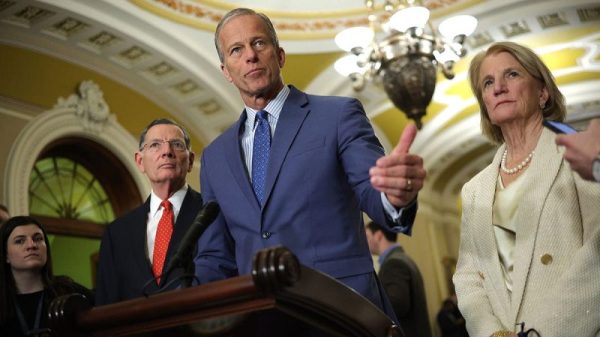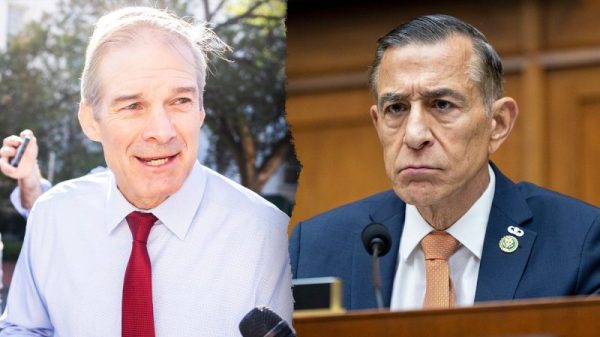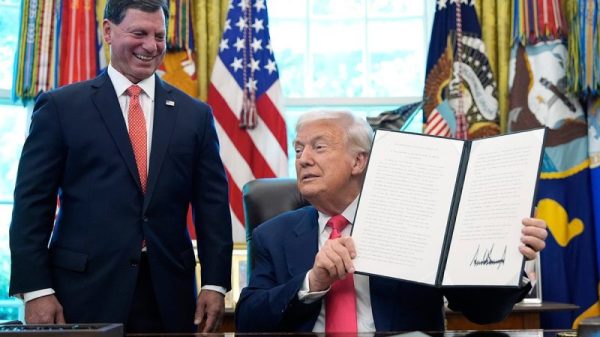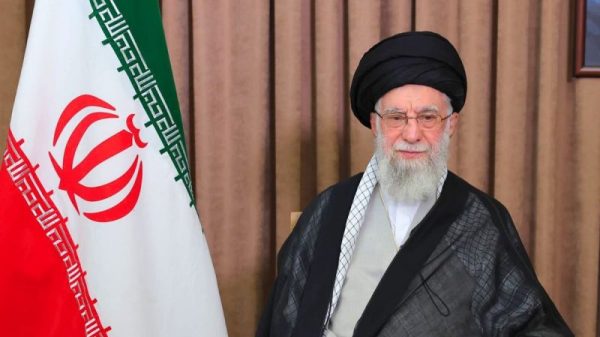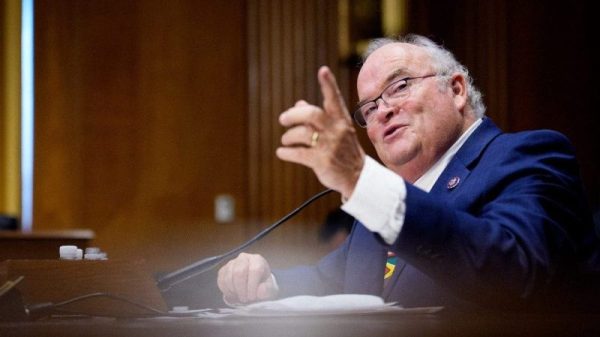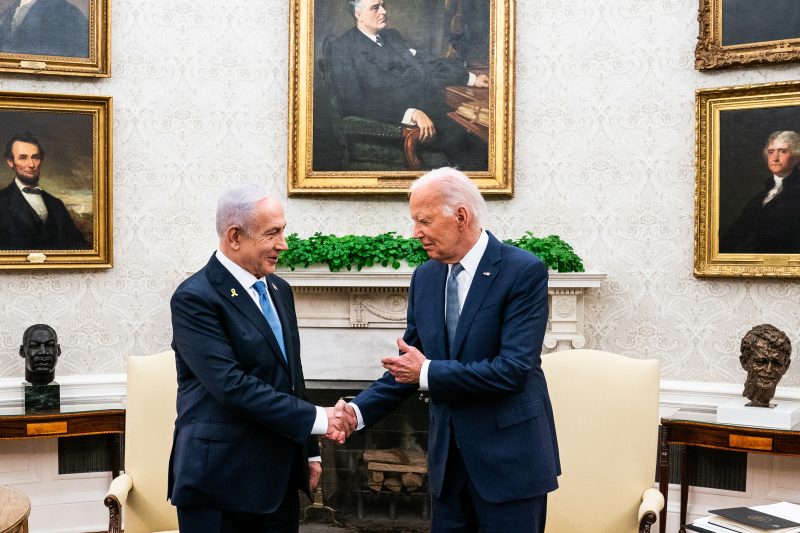U.S. officials said President Joe Biden’s months-long push for a cease-fire and hostage-release deal faced renewed urgency on Sunday after Israeli forces recovered the bodies of six hostages, including Israeli American Hersh Goldberg-Polin.
The United States has been talking to Egypt and Qatar about the contours of a final “take it or leave it” deal that it plans to present to the parties in the coming weeks — one that if the two sides fail to accept could mark the end of the American-led negotiations, according to a senior administration official, who spoke on the condition of anonymity to discuss private and sensitive deliberations. Biden officials said it was not immediately clear whether the discovery of the six hostages would make it more or less likely that Israel and Hamas could come to an agreement in the coming weeks.
“You can’t keep negotiating this. This process has to be called at some point,” said the senior official, who said the United States, Egypt and Qatar had been working on the final proposal before the six hostages were found dead in a tunnel beneath the southern Gaza city of Rafah. “Does it derail the deal? No. If anything, it should add additional urgency in this closing phase, which we were already in.”
The Israel Defense Forces said the six hostages were killed by their captors “shortly before” they were discovered. The senior administration official said the United States holds a similar assessment, believing that all six hostages were shot in the head and executed not long before their bodies were discovered.
Biden and his top aides have spent several months relentlessly trying to bring Israel and Hamas to an agreement that would see the release of the remaining living hostages in exchange for Palestinian prisoners and a temporary cease-fire in Gaza that they hoped would lay the groundwork for a permanent end to the war. CIA Director Bill Burns, Secretary of State Antony Blinken and White House Middle East Coordinator Brett McGurk are among those who have flown to the region numerous times and worked with Qatari and Egyptian negotiators to try to find an agreement.
Inside Israel, Prime Minister Benjamin Netanyahu is facing fury and increased pressure from the hostage families, who are demanding that he address the nation. Hundreds of thousands of protesters took part in nationwide protests Sunday night, and Israel’s largest labor union called for a general strike on Monday — threatening to shut down the country until Netanyahu agreed to a deal with Hamas to return the remaining captives. Hostage families have for months accused Netanyahu of prioritizing his political survival and victory against Hamas over a deal that would bring their loved ones home.
The Israeli embassy did not immediately respond to a request for comment Sunday.
Dennis Ross, a former American envoy to Israel, said Hamas’s leader in Gaza, Yehiya Sinwar, is unlikely to change his position because no one is able to exert pressure on him, but that it remains to be seen whether pressure inside Israel could force Netanyahu to more seriously engage in negotiations.
“For now, [Sinwar] will wait to see whether the general strike in Israel leads to a softening of Prime Minister Netanyahu’s conditions,” Ross said in an interview. “The strike, the likely massive protest, is in support of the hostage families and their view that Netanyahu’s strategy both in the negotiations and increasing IDF increase pressure on Hamas has failed.”
Hamas, in a statement, blamed Israeli bombings for the deaths, adding that “if President [Joe] Biden is concerned about their lives, he must stop supporting this enemy with money and weapons and pressure the occupation to end its aggression immediately.”
The Israel-Gaza war has created deep divisions among Democrats and across the United States since Hamas’s Oct. 7 attack, when militants killed about 1,200 people and took some 250 hostage. Israel’s retaliatory military campaign has killed more than 40,000 Palestinians, according to the Gaza Health Ministry, which does not distinguish between civilians and combatants but says the majority of the dead are women and children.
Last week, U.S. officials were negotiating some of the final details of a “bridging proposal” they put forward between Israel and Hamas to try to hash out remaining differences.
The discussions last week focused primarily on which hostages would be exchanged for specific Palestinian prisoners held inside Israel, some of whom were detained without trial, according to one of the senior officials.
The first phase of hostages includes women, the elderly and the ill and wounded — a group that included 23-year-old Goldberg-Polin, the American-Israeli whose parents spoke at the Democratic National Convention last month. Goldberg-Polin’s left arm was blown off by a grenade during the Oct. 7 attacks. Two Israeli women, Carmel Gat and Eden Yerushalmi, whose bodies were also recovered by the IDF on Saturday, were also on the list of those who would have been released in the first phase, the senior official said.
Those negotiations have taken on added complexity now that the six hostages are confirmed to be dead, the two senior administration officials said. The painstaking deliberations over which hostages will be released in exchange for specific Palestinian prisoners must now be renegotiated. Some Middle East experts said that the fewer living hostages there are, the less pressure there will be on Netanyahu to come to a deal — U.S. officials fear the number of living hostages may number only in the dozens.
The senior administration official said Hamas’s decision to execute the hostages with negotiations under ways “calls into question” Hamas’s seriousness in the talks. Hamas has proven obstinate at various points in the talks, even as Israeli officials have made concessions, the official said.
“Rhetoric aside, Netanyahu has never prioritized freeing the hostages. For now, he will be under a lot more domestic pressure to accept a cease-fire deal that saves the remaining hostages,” said Frank Lowenstein, a former State Department official who helped lead Israeli-Palestinian negotiations in 2014. “And if he waits this out, over time fewer living hostages could mean fewer Palestinian prisoners to release and what he sees as a more favorable negotiating position.”
Both Netanyahu and Hamas — particularly the group’s leader, Sinwar — have at various points been stubborn in reaching a deal. Netanyahu has come under intense criticism by the Israeli security establishment, domestic political opponents and the hostage families for delaying the conclusion of a deal by insisting in recent months on new demands, such as an indefinite Israeli military presence along the Philadelphi and Netzarim Corridors, two strategic corridors that mark the border area between Egypt and Gaza and a four-mile-long road just south of Gaza City that runs from east to west, respectively.
“U.S. officials are going to be burning up the phones over the next 48 hours to see if a deal can still be reached,” said a second senior U.S. official.
In the hours after this weekend’s discovery, Biden and Vice President Kamala Harris decided against publicly pressuring Netanyahu into a deal, choosing instead to unreservedly condemn Hamas for taking the lives of the hostages, even as Israelis harshly criticize Netanyahu. In statements released late Saturday, both Biden and Harris squarely blamed Hamas and did not mention Netanyahu.
Einav Zangauker, whose son Matan is believed to be held by Hamas in Gaza, criticized Netanyahu saying the Israeli prime minister has “decided to bury them in the rubble of his politics. … His hands are covered in the blood of the hostages who are being murdered in captivity.”
Israeli Defense Minister Yoav Gallant, who has emerged as one of Netanyahu’s fiercest critics, has also downplayed the benefits of continuing the war and bargaining for better deal terms versus securing the release of the hostages.
American Jewish groups have grappled with their private fury at Netanyahu but have so far been unwilling to challenge him publicly even as they see him sabotaging myriad U.S. efforts at a deal, according to a person familiar with internal discussions among several major organizations. The person noted the tone of Biden’s statement on Saturday.
Prominent Democrats and Republicans used the news of the killing of the six hostages to bolster arguments they have been making for months. Republicans argued that the discovery of the bodies highlighted why Israel must be allowed to continue its widely criticized military campaign to destroy Hamas, an effort that has decimated Gaza, with some even calling on the United States to consider bombing oil fields in Iran in what would be considered an act of war.
The Biden administration and Israel “should hold Iran accountable for the fate of remaining hostages and put on the target list oil refineries in Iran if the hostages are not released,” said Sen. Lindsey Graham (R-S.C.).
Former president Donald Trump, the Republican nominee, seized on the news to criticize Biden and Harris for failing to come to a deal. Trump has issued conflicting statements about how he would handle the war, arguing that it would not have happened under his leadership without specifying how he would have prevented it.
“The Hostage Crisis in Israel is only taking place because Comrade Kamala Harris is weak and ineffective, and has no idea what she’s doing,” Trump wrote on Truth Social. “Biden failed, and now he spends his day on the beach, plotting and scheming how to take out his once Political Opponent, ME … THE OCTOBER 7th ISRAELI CRISIS WOULD NEVER HAVE HAPPENED IF I WERE PRESIDENT!”
Democrats, meanwhile, said the news heightened the urgency to reach a deal, end the war and surge desperately needed humanitarian aid into the enclave.
“A ceasefire must be reached immediately that allows all remaining hostages to be released, humanitarian aid to flow into Gaza, and an elusive and neglected long-term vision for peace and stability to become a reality,” Sen. Dick Durbin (D-Ill.) said in a statement.

